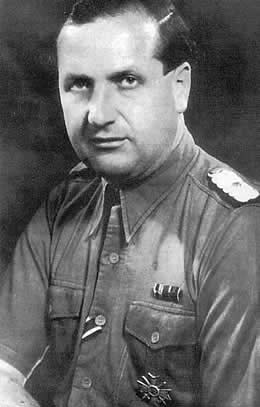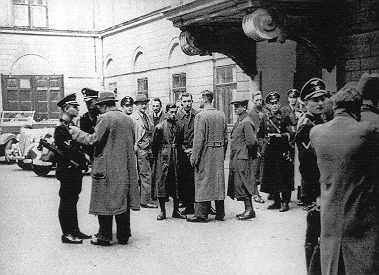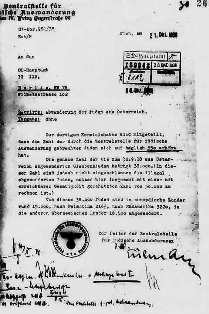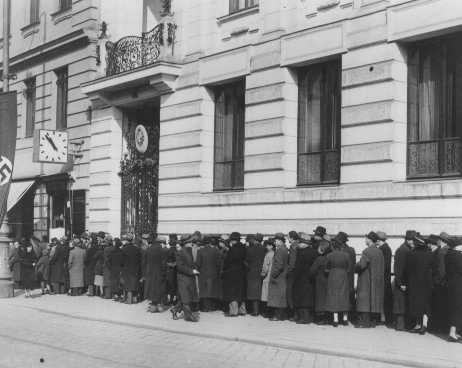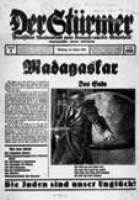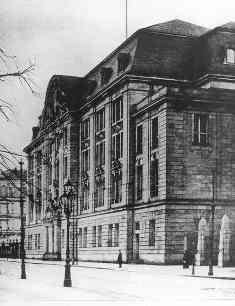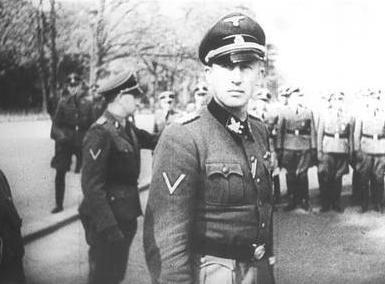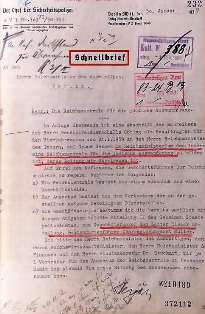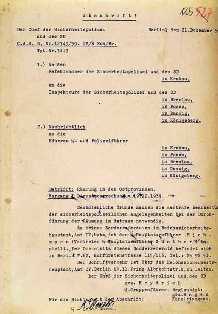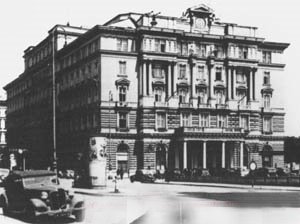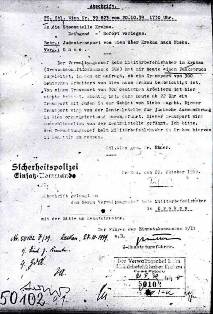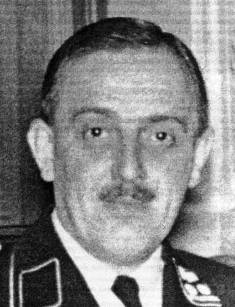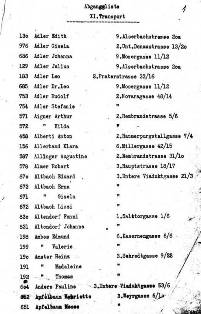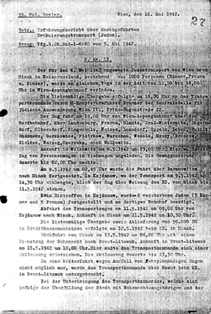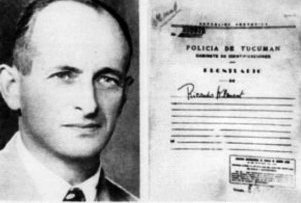Holocaust Education & Archive Research Team |
|
Occupation German Occupation of Europe Timeline
-
[The Occupied Nations]
Poland Austria Belgium Bulgaria Denmark France Germany Greece Hungary Italy Luxembourg The Netherlands Norway Romania Slovakia Soviet Union Sudetenland
| ||||||||||
Central Office for Jewish Emigration in Vienna Wilhelm Hoettl – Testimony Given for the Trial of Adolf Eichmann
My name is Dr. Wilhelm Hoettl, I am forty-six years old, Roman Catholic, married, administrator of the Bad Aussee Private Secondary School (Privatmittelschule). I was born on 19 March 1915 in Vienna, Esterhazygasse 1, Vienna 6, the son of Johann and Maria Hoettl, nee Renner. My father was an employee in the private sector, and my mother was a housewife.
In Vienna I attended four classes at primary school, eight at secondary school Reinprechtsdorferstrasse 24, Vienna 6, Natural Sciences Trend) and obtained my Certificate of Maturity in the summer of 1933. I then studied History, German and Geography at the Faculty of Philosophy of the University of Vienna, graduating in the autumn of 1937 with a doctorate in philosophy. I then taught German, mathematics and correspondence at the Vienna Technical School until, in the spring of 1938, I received a grant from the German Research Association which was to permit me enough time to qualify as a lecturer at the University of Vienna.
My academic pursuits were interrupted in the spring of 1938 when the Historical Institute at the University of Vienna was looking for experts on South-Eastern Europe. In reference to my activities at that time on behalf of the NSDAP (National Socialist German Workers' Party), I would refer to the content of the de-Nazification proceedings opened for me by the Salzburg authorities.
In any case, I can state definitely that until spring 1938 there was no connection with Adolf Eichmann, and at that time I also knew nothing of him. In the course of my subsequent activities in the Foreign Secret Service, I met Adolf Eichmann, as far as I remember, in March or at the beginning of April 1938. In order to obtain an exit permit to Hungary for a Jewish colleague of mine, Dr. Kauders, a lawyer who, I believe, had his office in Mistelbach, I was directed by the Vienna Secret Police (Geheime Staatspolizei: hereinafter - Gestapo) to Eichmann, who was said to be able to issue such exit permits expeditiously.
Subsequently, I had frequent dealings with Eichmann in similar cases, and on each occasion he granted my requests. My academic pursuits, which had been made possible by a grant from the German Research Association, were also designed to carry out purely historical research on South-Eastern Europe, and in this context I made several trips to Hungary and Romania, in the first half of 1938, particularly to the areas of German Folkdom (Volkstum) there (Banat, Transylvania).
In the course of this work, I received a great deal of support from Professor Dr. Heinrich von Srbik, who held the Chair in Modern History at the University of Vienna. However, this academic activity became of minor, merely supplementary, importance, as compared with my new task: research of the states of South- Eastern Europe for the Secret Service.
The grant I have referred to had nothing to do with political matters. The German Research Association was not a political institution. What actually happened was that, because of my prior knowledge of the area, I was approached by the Bureau of the District Office of the Security Service in Vienna 4, Theresianumstrasse, with an offer to work with them. I then became an employee on contract and gave up my university career, or rather as of then worked mainly for this office as my chief occupation.
Eichmann also worked in the Fourth District, in a similar office, situated in Prinz Eugen Strasse. It was in this building that Eichmann at that time set up the Central Office for Jewish Emigration, with which I intervened on various occasions over the following year, including contacts with Eichmann himself. I was basically interested in enabling Jews with Austrian nationality, with whom I had become acquainted both officially and privately, to leave the country expeditiously.
On one of these occasions - I should think it was in the autumn of 1938 - Eichmann outlined to me his plan which he had implemented by setting up the Central Office. He explained to me that, because of the red tape of the various authorities, and particularly their lack of co-ordination, Jews who were prepared to emigrate found it extremely difficult to leave the country.
For example, when the Revenue Office had issued the requisite certificate of lack of impediment, the exit visa from the passport police would, in the meanwhile, have expired, or it was no longer possible to obtain passage by sea.
It was because of such experiences that he (Eichmann) had for the first time set up in Vienna such a Central Office for Jewish Emigration, at which all authorities and offices which had anything at all to do with emigration, but also travel agencies, shipping companies and so on, had to have a representative.
He claimed that in this fashion he had managed to do away entirely with all red tape in connection with the emigration of the Austrian Jews and to speed up such emigration immensely. This field of Eichmann's activity extended certainly beyond Vienna, probably covering the whole of Austria, particularly since, as far as I am aware, there were no such Central Offices in other regional capitals.
Eichmann presented himself to me as an Austrian - from Linz; but he spoke with a marked north German accent, in a very cheeky style. At the time, as far as I remember, Eichmann was an SS Untersturmführer or Obersturmführer (second lieutenant or lieutenant), and wore the appropriate uniform with the relevant insignia. The office, which was housed in a large mansion, probably had a staff of some thirty or forty, including numerous female clerks and some civilians who, in my opinion, were representatives of travel agencies, shipping companies and so on.
The only name I remember of the staff or others who worked there is that of Guenther, with whom I intervened later at a similar office for Jewish emigrants in Prague, and also in Berlin. However, judging from his manner of speech, he was not from Vienna, but rather from Saxony or Thuringia. At this Central Office for Jewish Emigrants in Vienna, I met the owner of a Hamburg travel agency by the name of Schlie. During my talks with Eichmann, I gained the impression that he considered it to be his main task to make Austria Judenfrei, but obviously without any idea of using actual force.
At that time in Vienna nobody, and particularly also not Eichmann, had thought of any physical extermination of Jews, or even considered such a thing. At that time, as far as I remember, there was as yet no mention of deportations either.
As far as Eichmann as a person is concerned, I can state the following in answer to questions from the Court:
I can only base myself on what he told me, according to which he was from Linz (but apparently, as I gathered later, he himself did admit that he was from Solingen in Germany).
In any case, never having completed his education properly, he worked in the private sector (his brother was a lawyer in Linz), I think as a representative of an oil firm. Somehow, he must have been active in politics in Austria in 1932 or 1933, because he told me that in 1933 he fled Austria, going to Germany to the Legion (the Austrian Legion), and was then transferred by it to Berlin, where he was attached to the Head Office of the Security Service.
In order to obtain promotion by way of specialization, he studied Jewish subjects, and when German service units went to Austria, following the entry of German troops on the Anschluss in 1938, he accompanied them to Vienna and set up the office already referred to in Prinz Eugen Strasse.
He also told me that he had made an official trip to Palestine in 1937, and that he could speak some Yiddish and Hebrew. Whether Eichmann is of Jewish descent, I do not actually know. I can confirm that already in his earlier years that was the impression he gave, and because of that he was teased by his colleagues, which always made him angry; but I never discussed this matter with him.
The circumstances I have described, which applied to Eichmann as much as to me, prevailed until November 1938, at which point, as is common knowledge, considerably severer measures were taken because of the attack on the German Embassy Counsellor in Paris. Up till then, my relationship had basically been a personal one only, not one between offices; it is true that his department and mine were subordinate to the same authority, i.e., the Head Office of the Security Service in Berlin, and also in some measure to the District Office of the Security Service in Vienna.
But the development of these authorities was still in a state of flux. Therefore, during this first period in particular, there can be no question of collaboration between Eichmann and myself. The information I was providing had nothing at all to do with Jewish questions. In answer to the questions, I should like to add that in that first period of activities I heard nothing at all about Eichmann using coercive methods or causing such methods to be used, in order to compel Jewish emigration. If you had to go on business to that office building, you saw queues of Jews all eager to emigrate.
I myself remember having such dealings with Eichmann in Vienna until the end of 1938, or the beginning of 1939 at the latest. I would assume that he remained in Vienna when the rest of Bohemia was occupied, i.e., March 1939, whereupon he was transferred to Prague, where he set up the same type of Central Office for Jewish Emigration. I am not sure who was his successor in Vienna, and whether this was Guenther, whom I referred to above.
As far as I myself was concerned, at the beginning of 1939 my activities increasingly tended towards Berlin, where at that time the Foreign Secret Service was being reorganized on a large scale. That was also when the Head Office for Reich Security (RSHA) was set up, including the previous Head Office of the Security Service, the Secret State Police Office and the Criminal Police Office.
This was probably when Eichmann joined Department IV (Gestapo) as a Specialist Officer, so that this Central Office for Jewish Emigration - in the meanwhile, apart from the Prague office, one had also been set up in Berlin - was subordinate to the Head Office for Reich Security, and, as I assume, more particularly to Department IV (Gestapo).
The chief of Department IV was SS General Heinrich Müller; the head of Department VI (Foreign Secret Service) was SS General Jost. Because of the different duties of the two Departments, there was obviously no direct official collaboration between their personnel. After my general comments on Eichmann's activities in Vienna,
I shall now add, in reply to the specific questions asked by the representative of the Accused Eichmann in the criminal proceedings, i.e., Nos. 1 to 45, the following:
In accordance with my rank, I was taken on as SS Untersturmführer on a full-time basis, and then, at the end of 1939, I was promoted to SS Obersturmführer, in 1940 or 1941 to SS Hauptsturmführer, and in November 1943 to SS Sturmbannführer. At the end of the war in 1945, I was also demobilized with the rank of Sturmbannführer in the Waffen- SS (the Armed SS). The reason was that, while I was given the first ranks within the SS (Security Service), I received the last rank as part of the Waffen-SS, because in the meanwhile - and I shall return to this later - legal proceedings had been taken against me in the SS and Police Court, as a result of which I was transferred to the Waffen- SS. The rank of a Sturmbannführer in the SS, including the Waffen-SS, corresponds to that of a major in the army.
As to whether I worked in an official capacity in the Head Office for Reich Security, my answer is as follows:
While my initial activities, described this morning, did not belong directly to this area (the Security Service District Office was merely subordinate to the Head Office for Reich Security), as of the autumn of 1939 I was transferred to the Head Office for Reich Security in Berlin, to Department VI (Foreign Secret Service); this office was located at Berlin W., Berkaerstrasse. I worked there until October 1941. In October 1941 my activities were interrupted, or rather terminated, as a result of the legal proceedings mentioned before. I shall return to this later.
My first position in Department VI of the Head Office for Reich Security was that of a "Delegate South" (Beauftragter Sued). In practical terms this meant secret service activities in South and South-Eastern Europe. My last position, from 1 February 1943 until the end of the War, was that of a Specialist Officer (Referent) and deputy group leader (department head) in Department VI, with almost the same duties.
Because of the distance from Vienna (or Prague, where, as has been mentioned, Eichmann was transferred in March 1939), I was no longer in touch with him as I had been in Vienna, and also our respective official duties did not give occasion for any further contacts. In terms of rank, my position in Berlin was equivalent to that of an Oberregierungsrat (senior government counsellor), and my pay was in accordance with the position; thus, it was a position provided for in the office work plan.
Such posts required, in principle, an academic degree; in the case of special services to the Party, however, this requirement could be waived. Neither in Vienna nor in Berlin did I receive an official dwelling, but made my own private arrangements. I assume that the question about the Abteilungsleiter (department head) relates to the Amtschef (bureau chief), because, as far as I know - at least in Department VI - department head was a purely honorary title for Specialist Officers (Referenten) who had a particularly large scope of duties.
My Department Chief was SS Brigadeführer and Major-General in the Waffen-SS, Walter Schellenberg. As far as I know, Eichmann was a Specialist Officer in Department IV of the Head Office for Reich Security, but in the meanwhile there was a change in the names given to the departments. I must here state that Eichmann was also transferred to the Head Office for Reich Security, but independent of my transfer to Berlin, and not to Department VI like myself, but to Department IV, Gestapo.
A department such as Eichmann had there, for Jewish Affairs, was more or less an office or section of its own. His superior chief, as has already been mentioned briefly today, was SS General Heinrich Müller, but it is possible that there was another group leader between them. Several Sections would be subordinate to a single Group Leader, and there must have been four or five Groups altogether. Jewish Affairs was dealt with exclusively by Eichmann's Section, for the whole of Germany.
As I have said, there were several groups, and several sections in each group; each individual section dealt with a particular category of people: one, for example, would deal with Communists and another with political suspects, and so on. I am not aware of Eichmann having special powers for the running of his Section, or whether these differed from the powers or authority of other Specialist Officers in their work.
I consider it highly improbable that Eichmann would have received any written power - some official appointment or whatever - authorizing him as a Specialist Officer to exterminate the Jews, just as other Specialist Officers were most definitely not authorized to liquidate or exterminate the groups they were called upon to monitor. If any orders to such an effect were given, then, at the very most, they would have been given orally and in complete secrecy. But I do not know anything about such secret assignments.
I have already answered this question in my general description of Eichmann's activities in Vienna. However, I know nothing about the time after the period I have referred to, i.e., from March onwards, and so cannot provide anything concrete from March to July 1939. I can only understand the question about dates by assuming that the person asking the question was perhaps not aware of the fact that the actual date of the transfer to Prague and the date of the order for the transfer were at variance. Whatever the explanation behind the question, I am unable to provide any more information in this context.
In Vienna, Eichmann was a Specialist Officer with the Inspector (Inspekteur) of the Security Police and the Security Service. In the first phase (from March 1938 on), this office was actually called the SD Oberschnitt (Security Service District Office). It is not simple to answer this question; the main point is that I do not know how long the Central Office in Vienna set up by Eichmann continued to operate, and I would tend to assume that, in the nature of things, it was closed down at the beginning of the War, i.e., in September 1939, because when the War broke out, any legal emigration had to stop.
As I have said, however, I am not sure about this. I only know that also after Eichmann left for Prague, the Central Office in Vienna carried on its work. I would assume that also after he was moved to Prague he continued to be in overall charge of the Vienna Central Office, and occasionally may have come to Vienna, where a deputy of his ran the office.
I would also assume that a similar relationship existed between him and the Berlin Central Office for Jewish Emigration, which I referred to this morning, and which was set up later than in Vienna. If you take this assumption or restriction up to September 1939 (the beginning of the War), I can only say that, according to my own personal observations, there was a rapid emigration of those Jews who were interested in emigration. I do not know what this would be in terms of numbers; I can only refer to the relevant publications which have been published since the end of the War.
The developments in Germany actually followed the relevant developments in Austria, because as far as I know, despite the Machtergreifung (Hitler's coming to power) in 1933, there was no such furtherance as yet of emigration in 1933, but that took place in Berlin only, so to speak, after the Viennese example. Moreover, since I had almost no private connections in Berlin, unlike in Vienna, where I had friends from former times, I know nothing from my own observations about the activities and results of the Berlin Central Office.
The only thing I can say about these four questions relative to a territorial solution of the Jewish Question, is to answer in the negative - that I have never heard of any "Judenstaat Nisko" - but in the affirmative that Eichmann did once ask me in Vienna, at the end of 1938 or the beginning of 1939, whether, as a historian, I could tell him on what occasion Napoleon proposed the plan of shipping the Jews off to Madagascar. I replied to him, according to the truth, that I was not aware of any such historical fact.
Did he develop any activities in this respect? I know only that he said he needed the reply for some lecture or presentation he was to make. I have no first-hand information about anything else which Eichmann did in order to implement a Madagascar Plan. I can reply in the affirmative to the first part of the question insofar as Eichmann, as I have said, was the head of the Central Office which co-ordinated a number of authorities and offices, including the Finance Offices, in relation to Jewish emigration.
So if, as I gathered from hearsay, Jews who needed to emigrate had to obtain a certificate from the competent Finance Office, attesting to their having paid a special levy, this aspect of financial administration would definitely have been under the control of the Central Office run by Eichmann.
However, I am not aware that beyond this, on a personal level, Eichmann had anything to do with imposing these levies on Jews, or even being the initiator of this levy on Jews; as far as I know they were decreed by Goering after the murder, I have already mentioned, of the legation counsellor in Paris. As I have said, I only know of this levy on assets from hearsay; and also from hearsay I know that the assets handed over were to be used to finance the emigration of property-less Jews.
In fact, I am not entirely sure whether the levy on assets decreed by Goering - i.e., the generally known penalty applied to German Jews for the murder of that legation counsellor by Grynszpan - was the same as that special levy which I heard about, which, as I have said, was supposed to be used to finance the emigration of property-less Jews.
As to whether the levies, paid in money or valuables or whatever, went to Eichmann's office as the central body, or whether they were passed on, I do not know. It was decided to adjourn the hearing until the following day, 20 June 1961, at 9.30 a.m. at the same place. The hearing ended at 5.20 p.m. The hearing continued on 20 June 1961 at 9.30 a.m.
The witness stated in continued examination as follows:
With regard to the physical annihilation of the Jewish People, until I lost my post and was transferred to the Waffen-SS, the only thing that I knew was that the Einsatztruppen (sic: Operational Troops) of the Security Police and the Security Service had received orders to liquidate by shooting the supporters of Communist ideology, particularly the Jews.
However, at that time I was not aware of the details of this order and its origin. It was not until later that I heard from SS General Dr. Stahlecker, who in 1938 had briefly been my chief in Vienna, that this order came from Hitler himself and had been passed on by Heydrich to these Operational Troops.
It should be understood that this problem occupied my mind to a great extent, both then and after the War, since I am a historian of the modern period. During the time I was in prison, and above all when I was in Nuremberg as a witness, I had ample opportunity to talk about this extermination programme with those who had been the leading functionaries of the Third Reich.
The unanimous opinion of these men, who obviously had a far greater insight than I did, was that the idea of physical extermination of the Jewish People could only have originated with Hitler, and that in this regard he had not been influenced in any way by others. What is interesting is that Dr. Brand, who for many years was Hitler's personal physician and as his doctor had a good personal relationship with him, expressed himself similarly.
As to what were the real mainsprings of Hitler's hatred and desire for extermination, I can only guess that he was influenced by some primitive idea, although his disease - Parkinson's - may have played some role in his conception that all Jews were potential "enemies of the Reich," and that therefore, in the long run, the Third Reich would not be able to exist unless they were eliminated.
It is also possible that some role was played by his own personal observations from his early years in Vienna, which he considered to shed an unfavourable light on the Jews. Concrete indications that with Hitler - just as was the case, on clear facts, for Heydrich - a further factor consisted in his being of partial Jewish descent are not known to me; such allegations have only been put. On being asked now whether the well-known delivery into Gestapo detention of the Viennese banker Louis Rothschild (head of the Vienna Rothschild Bank) took place at Eichmann's instigation or with his co-operation, I think I must reply in the negative.
I believe that his arrest, which was subsequently revoked after a large ransom was paid, probably resulted from the direct intervention of an office not subordinate to Eichmann, i.e., the Vienna Gestapo. An old friend of Baron Rothschild's, Count Dr. Karl Khuen, asked me to mediate for Rothschild to be allowed to have a radio in his prison cell in Morzinplatz, Vienna, and permission was obtained from a Gestapo official called Dr. Ebner; from that, too, I concluded that Eichmann had nothing to do with these purely police matters.
The statement I have just made related to the period before my transfer to the Waffen-SS. After that, until I was reinstated, I was unable to make any relevant observations about subsequent phases in the persecution of the Jews in general, or Eichmann's activities in particular. Dr. Kaltenbrunner had originally been a lawyer in Linz, and as a result of his illegal activity with the SS, had received an important position in 1938, when the annexation of Austria took place.
However, despite the fact that both Kaltenbrunner and Eichmann were from Linz, as far as I could see Kaltenbrunner did not know Eichmann well. It is certainly not true that they used the familiar "du" form to address each other. When Dr. Kaltenbrunner occupied the post of State Secretary for Security Matters in the government of Dr. Seyss-Inquart, he became the Higher SS and Police Leader in Vienna.
Because of the Berlin offices' mania for centralization, to which I have already referred, the position of a Higher SS and Police Leader had lost a great deal of weight, however, and it was therefore a great surprise even for those most in the know when in January 1943, Hitler appointed Kaltenbrunner Chief of the Security Police and the Security Service, as successor to Heydrich, who had been assassinated.
At all events, I was able to ascertain from my own observations that once this Central Office started operating, Jewish acquaintances of mine who had previously waited in vain for their emigration papers, received all the requisite documents for their departure within a matter of days. In this connection I think I should also mention the fact that the foreign consulates had links with this Central Office and were doubtless extremely accommodating in the issuing of visas. According to my sources, the treatment in this Central Office was completely decent.
Dr. Stahlecker, who, as far as I know, was a career policeman, came to Vienna in 1938 as the Inspector of Security Police and the Security Service, a post which, as far as I remember, he held for a few months. I did not know Dr. Stahlecker before that. I had no more official dealings with Dr. Stahlecker, but I remember meeting him again in Vienna in 1942, when he was on a private visit.
With several other gentlemen, we went to a pub and had lengthy conversations in which Stahlecker spoke very negatively about German methods in Russia. At this time Stahlecker was the leader of an Operations Unit in Russia and must have been in Vienna on leave.
To the best of my memory, as Inspector of the Security Police and the Security Service in Vienna, Stahlecker gave a great deal of support to Eichmann in realizing his plan to set up a Central Office for Jewish Emigration. If I am not mistaken - although I can only state this with due reservation, later - in Prague, Stahlecker was Eichmann's superior again.
In any case, I do remember Dr. Stahlecker telling me most indignantly of an order from Heydrich to keep under surveillance Freiherr (Baron) von Neurath, who was appointed Reich Protector for Bohemia and Moravia in 1939, because of his connections (I believe that Mrs. Stahlecker was related to Neurath or to his wife).
Sources:
Adolf Eichmann – The Complete Trial Transcripts Bildarchiv der Oesterreichischen Gesellschaft fuer Zeitgeschichte Austria; In: Encyclopaedia Judaica 1971, Vol. 3 presented by Michael Palomino (2007) Oesterreichisches Staatsarchiv – Abteilung: Allgemeines Verwaltungsarchiv Expulsion and Extermination The Fate of the Austrian Jews 1938-1945 Austrian Resistance Archive Vienna 199. Holocaust Historical Society Jewish Museum of Vienna Yad Vashem
Copyright Victor Smart H.E.A.R.T 2009
|
